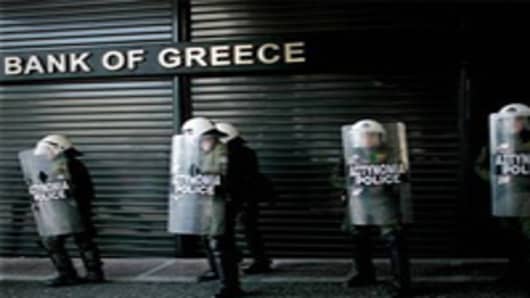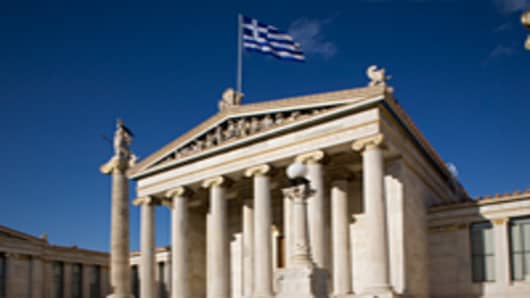Indeed, some banks and hedge funds have already begun to turn their attention to other indebted nations, particularly Portugal, Spain, Italy and, to a lesser degree, Ireland.
The role of such traders has become increasingly controversial in Europe and the United States. The Justice Department’s antitrust division is examining whether at least four hedge funds colluded on a bet against the euro last month.
“If the problems of Greece aren’t addressed now, there is a risk the market will focus on the next weakest link in the chain,” said Jim Caron, global head of interest rate strategy at Morgan Stanley.
Whatever the outcome in Athens, the debt crisis in Europe threatens to tip the financial, as well as political, balance of power across the Continent. With Germany and France emerging as the most likely rescuers, leaders in Berlin and Paris could end up dictating fiscal policy in Portugal, Ireland, Italy, Greece and Spain.
And in the months ahead, fears about the growing debt burden elsewhere in Europe are likely to return, according to investors and strategists. That is particularly worrying given that Western European countries must raise more than half a trillion dollars this year to refinance existing debts and cover their widening budget gaps.
The way fear can spread from capital to capital reminds Mr. Caron of how the American financial crisis played out. “What people are doing in the markets is no different from what they did with the banks,” he said. “First it was Bear Stearns, then it was Lehman Brothers and so on. That’s what people are worried about.”
France and Germany are emerging as the crucial backers of any lifeline for Greece, but they have slow growth and budget troubles of their own — deficits equaling 6.3 percent of gross domestic product in Germany and 7.5 percent in France. And among voters in both countries, “there is very little appetite for rescues,” said Marco Annunziata, chief economist for Unicredit.
The most vulnerable country after Greece, some analysts say, is Spain, which has been mired in a deep recession. Facing an unemployment rate of 20 percent, a budget gap of more than 10 percent of gross domestic product, and an economy expected to shrink by 0.4 percent this year, Madrid has little wiggle room if investors shun an expected 85 billion euros in new bond offerings this year.
Spain’s neighbor Portugal is also vulnerable. Large budget and trade deficits, combined with a shortage of domestic savings, leave Portugal dependent on foreign investors. And, as in Greece, there may be little political will to slash spending or raise taxes.
That’s in sharp contrast to Ireland, which had been a source of anxiety last year. New austerity measures, including a government hiring freeze and public sector wage cuts, have put it in a stronger position as it raises 19 billion euros this year.
The Italian government is also heavily indebted — it has more than $2 trillion in total exposure — but it is also in a slightly stronger position than Spain or Portugal because its economy is expected to grow by 0.9 percent this year and 1.0 percent next year. In addition, its budget is not as far out of whack, with the deficit this year expected to equal 5.4 percent of G.D.P.



